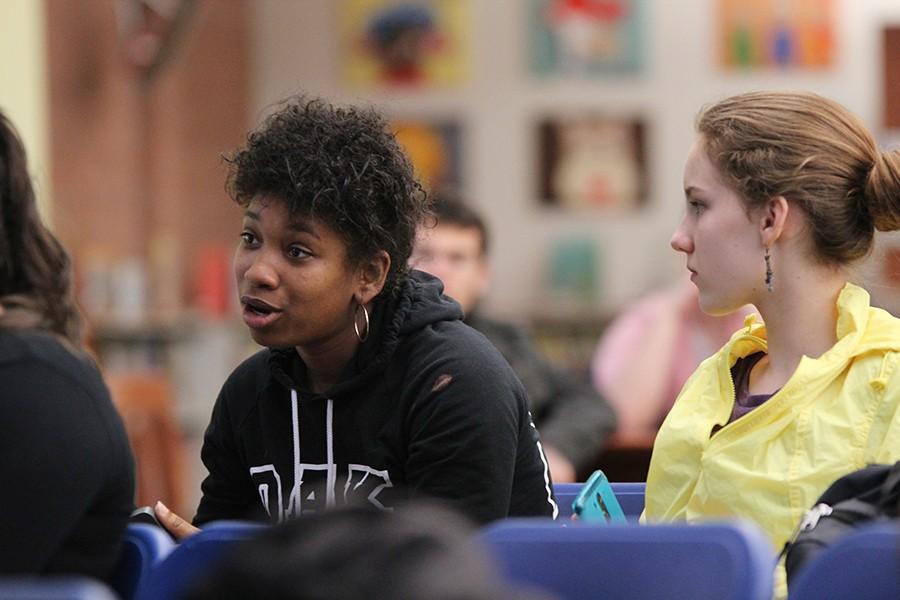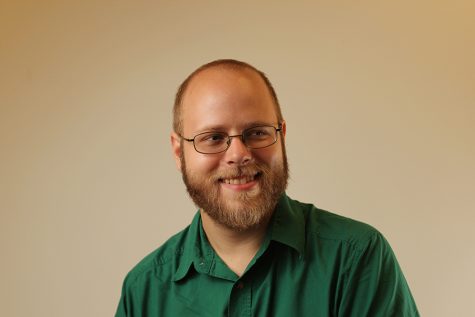Political club hosts forum
Club discusses initiatives, programs spurs civil conspiracy debate
Christian Urrutia / The Advocate
Louisa Jackson (LEFT), a business administration major, asks a question during the “Political Activism, Beyond the Ballot Box,” event at the Library and Learning Resource Center on Thursday.
Mar 16, 2016
The Community Organizing and Political Action (COPA) Club presented “Political Activism, Beyond the Ballot Box,” on Thursday from 4-5 p.m. on the main floor of the Library and Learning Resource Center, co-sponsored by the Library.
COPA secretary Milca Baires said, “We invited a variety of panelists who are still tied together.”
Vanna Gonzales, political science professor opened the panel, introduced the speakers and gave a short talk about COPA.
She said COPA meets every third Thursday of the month and right now there is opportunity for a poll-worker trainer to come to the college.
Right now only 12 people have signed up to be trained, and the trainer will only come for a minimum of 20 people.
The representative for the Canal Alliance was delayed by the inclement weather, but arrived after a few minutes.
Community Organizer Megan Zapanta, representing the Asian Pacific Environmental Network (APEN), was the first panelist.
Zapanta said APEN exists to address environmental justice issues in Richmond, Oakland and around California.
“The environment is the air we breathe, the water we drink,” Zapanta said. “Communities speak for themselves, partially because no one else will.”
Zapanta said her interest in the environment crystalized when she was 16, during a San Diego fire that killed a girl she knew.
“What we really believe in is a just transition (from fossil fuels to solar power).” End the bad, build the new.”
APEN does some electoral organizing and Zapanta discussed several initiatives including rent control in Richmond, Richmond Kids First and Move the Money which aims to make universities invest in positive things instead of oil.
APEN has youth meetings twice per month and APEN Academy in June. APEN is associated with the California Environmental Justice Alliance.
Zapanta said, “There are lots of programs that no one really takes advantage of.”
The Canal Alliance Operations Manager Lucia Martel-Dow spoke next. She described her life path. She was born in Venezuela and attended law school there.
When she moved to the U.S. she worked for a healthcare nonprofit in the Bay Area for low-income people, then went to UC Hastings College of Law in Berkeley to get her law degree.
She did financial work briefly, then found the Canal Alliance.
Martel-Dow said the Canal Alliance exists to give low-income Spanish speakers the tools they need to thrive.
“It’s great to talk about social justice, but it’s hard if you don’t know where you’re going to sleep next week,” Martel-Dow said.
To help them be lifted out of poverty, people are directed toward computer classes, ESL classes and resumé writing classes.
Martel-Dow said, “In Marin you have the richest of the rich and the people on the bottom. We are hoping to make that gap a little bit smaller.”
The Canal Alliance also helps with domestic violence, for trauma suffered back in immigrants’ home countries or here, Martel-Dow said.
Martel-Dow said, “We do help Spanish speakers mostly, but non-Spanish speakers are welcome. There are many programs for youth. If you’re afraid to go back to your country you can apply for asylum.”
There are also services for those preparing for their citizenship exam.
The Contra Costa Chapter of Health Care for All-California was represented by Jonee Grassi and Nel Benningshot.
Benningshot said she and her father lived in the Netherlands. He died when he was only 50 after 10 years of illness, but due to universal healthcare he had the best medical care available at the time and didn’t need to worry about bills, she said.
Benningshot said she came the U.S. in the 70s, and healthcare was pretty good then. Since then she says healthcare “has gone down and down and down,” particularly in the 80s.
Health Care for All is currently trying to get real universal healthcare in California by passing into law single payer healthcare.
Benningshot said, “We’re using Canada as our model. In Canada if you’re a citizen, you’re covered.”
“If there’s a health-related issue we try to get involved. We tried to save the Doctor’s Hospital in San Pablo. We try to be as involved as possible at the local level,” Benningshot said.
Grassi said that their goals include healthcare for those residing without legal permission, which children already have until age 19.
When challenged on the issue of spending taxpayer money on non-citizens, Benningshot said it endangers the population to let people stay sick and treating them saves money because people don’t end up in the emergency room.
Now retired Contra Costa College political science professor Leonard McNeil, who is also the former mayor of San Pablo, said, “I think a lot of people are not aware of the career opportunities in the non-profit sector that people should consider.”
After the panel, two-thirds of the about 30 attendees crowded upstairs in the LLRC for the reception.
They settled in at the table eating the Three Season Restaurant’s catered cuisine in the CRC conference room and spilling out into hall.
A lively debate started, with people discussing conspiracy theories and immigration.
Baires said, “We want our students to be political activists.”
COPA Treasurer Iris Mota discussed why COPA chose who they did for the panel.
Mota said, “A few years ago my sister’s sister-in-law needed dialysis three times per week. She was undocumented. She decided to sell her belongings and move back to Mexico” leaving her three children, who were U.S. citizens.
“I found Pre-Health Dreamers, and they put her in touch with Health Care For All,” Mota said.
Her family friend didn’t have to move because she got the care she needed, but if she’d had screenings she might not have needed a new kidney.



